Deck 15: River Systems and Landforms
Question
Question
Question
Question
Question
Question
Question
Question
Question
Question
Question
Question
Question
Question
Question
Question
Question
Question
Question
Question
Question
Question
Question
Question
Question
Question
Question
Question
Question
Question
Question
Question
Question
Question
Question
Question
Question
Question
Question
Question
Question
Question
Question
Question
Question
Question
Question
Question
Question
Question
Question
Question
Question
Question
Question
Question
Question
Question
Question
Question
Question
Question
Question
Question
Question
Question
Question
Question
Question
Question
Question
Question
Question
Question
Question
Question
Question
Question
Question
Question

Unlock Deck
Sign up to unlock the cards in this deck!
Unlock Deck
Unlock Deck
1/154
Play
Full screen (f)
Deck 15: River Systems and Landforms
1
Rectangular drainage patterns form primarily as a result of
A) differential resistance to erosion.
B) domal uplift.
C) flow through anticlinal and synclinal topography.
D) flow through a faulted landscape.
A) differential resistance to erosion.
B) domal uplift.
C) flow through anticlinal and synclinal topography.
D) flow through a faulted landscape.
D
2
The high ground that separates one valley from another and directs sheetflow is known as
A) the maximum contour elevation.
B) drainage divide.
C) an interfluve.
D) the continental divide.
A) the maximum contour elevation.
B) drainage divide.
C) an interfluve.
D) the continental divide.
C
3
Stream drainage patterns are determined by which of the following?
A) regional steepnees and relief
B) variations in rock resistance
C) climate
D) climate, regional steepness and relief, and variations in rock resistance
A) regional steepnees and relief
B) variations in rock resistance
C) climate
D) climate, regional steepness and relief, and variations in rock resistance
D
4
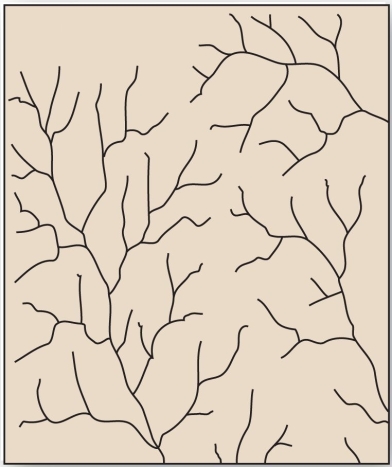
This tree-like drainage pattern efficiently moves water and sediment through its system due to minimization of the total length of each branch.
A) dendritic
B) trellis
C) radial
D) deranged

Unlock Deck
Unlock for access to all 154 flashcards in this deck.
Unlock Deck
k this deck
5
A drainage system that maintains its original course and pattern as it erodes into underlying horizontal beds of different structure than that in which the system evolved is called a
A) deranged pattern.
B) discordant streams.
C) annular patterns.
D) superposed stream.
A) deranged pattern.
B) discordant streams.
C) annular patterns.
D) superposed stream.

Unlock Deck
Unlock for access to all 154 flashcards in this deck.
Unlock Deck
k this deck
6
Processes that are related expressly to streams and rivers are termed
A) fluvial.
B) geomorphic.
C) lemnetic.
D) lotic.
A) fluvial.
B) geomorphic.
C) lemnetic.
D) lotic.

Unlock Deck
Unlock for access to all 154 flashcards in this deck.
Unlock Deck
k this deck
7
The area of land from which all water in it drains into the same place is known as a(n)
A) interfluve.
B) watershed.
C) drainage divide.
D) fluvial units.
A) interfluve.
B) watershed.
C) drainage divide.
D) fluvial units.

Unlock Deck
Unlock for access to all 154 flashcards in this deck.
Unlock Deck
k this deck
8
Of the world's largest rivers, which has the greatest discharge?
A) Zaire (Congo) River
B) Amazon River
C) Missouri-Ohio-Mississippi river system
D) Chang Chiang (Yangtze) of Asia
A) Zaire (Congo) River
B) Amazon River
C) Missouri-Ohio-Mississippi river system
D) Chang Chiang (Yangtze) of Asia

Unlock Deck
Unlock for access to all 154 flashcards in this deck.
Unlock Deck
k this deck
9
Steep slopes and some relief generally produce which drainage pattern?
A) dendritic
B) deranged
C) parallel
D) annular
A) dendritic
B) deranged
C) parallel
D) annular

Unlock Deck
Unlock for access to all 154 flashcards in this deck.
Unlock Deck
k this deck
10
A central peak,such as a volcanic mountain, generally produces a ________ drainage pattern.
A) radial
B) trellis
C) parallel
D) annular
A) radial
B) trellis
C) parallel
D) annular

Unlock Deck
Unlock for access to all 154 flashcards in this deck.
Unlock Deck
k this deck
11
A basin in which water leaves via evapotranspiration or subsurface gravitational flow instead of reaching the ocean is said to have
A) a disappearing stream.
B) sheetflow.
C) a closed system.
D) internal drainage.
A) a disappearing stream.
B) sheetflow.
C) a closed system.
D) internal drainage.

Unlock Deck
Unlock for access to all 154 flashcards in this deck.
Unlock Deck
k this deck
12
Overland flow can concentrate in small grooves called ________, which can enlarge to form ________.
A) striations; potholes
B) potholes; striations
C) rills; gullies
D) gullies; rills
E) striations; gullies
A) striations; potholes
B) potholes; striations
C) rills; gullies
D) gullies; rills
E) striations; gullies

Unlock Deck
Unlock for access to all 154 flashcards in this deck.
Unlock Deck
k this deck
13
The general term for channelized water flow, regardless of size, is
A) river.
B) gully.
C) stream.
D) rill.
A) river.
B) gully.
C) stream.
D) rill.

Unlock Deck
Unlock for access to all 154 flashcards in this deck.
Unlock Deck
k this deck
14
Drainage density refers to
A) the thickness of the water in the stream.
B) the number of channels in an area.
C) a measure determined by dividing the length of all the the channels by the area of its drainage basin.
D) the arrangement of channels in a given area.
A) the thickness of the water in the stream.
B) the number of channels in an area.
C) a measure determined by dividing the length of all the the channels by the area of its drainage basin.
D) the arrangement of channels in a given area.

Unlock Deck
Unlock for access to all 154 flashcards in this deck.
Unlock Deck
k this deck
15
Watersheds are defined by
A) continental divides.
B) drainage divides.
C) stream orders.
D) fluvial units.
A) continental divides.
B) drainage divides.
C) stream orders.
D) fluvial units.

Unlock Deck
Unlock for access to all 154 flashcards in this deck.
Unlock Deck
k this deck
16
What is the drainage density of a 100  drainage basin with 25 miles of stream, running through three rivers?
drainage basin with 25 miles of stream, running through three rivers?
A) 3
B) 33.333
C) 4 mi./mi²
D) 0.25 mi./mi²
 drainage basin with 25 miles of stream, running through three rivers?
drainage basin with 25 miles of stream, running through three rivers?A) 3
B) 33.333
C) 4 mi./mi²
D) 0.25 mi./mi²

Unlock Deck
Unlock for access to all 154 flashcards in this deck.
Unlock Deck
k this deck
17
Drainage basins are ________ systems.
A) open
B) closed
C) open in terms of energy, closed in terms of matter
D) closed in terms of energy, open in terms of matter
A) open
B) closed
C) open in terms of energy, closed in terms of matter
D) closed in terms of energy, open in terms of matter

Unlock Deck
Unlock for access to all 154 flashcards in this deck.
Unlock Deck
k this deck
18
The science of water and its global circulation, distribution, and properties is known as
A) geomorphology.
B) climatology.
C) lithology.
D) hydrology.
A) geomorphology.
B) climatology.
C) lithology.
D) hydrology.

Unlock Deck
Unlock for access to all 154 flashcards in this deck.
Unlock Deck
k this deck
19
Drainage density is determined by
A) dividing the number of streams in a basin by the basin area.
B) dividing the actual path length of a stream by the shortest path length of the stream.
C) averaging the discharge values across a drainage basin.
D) dividing the total length of all stream channels in the basin by the area of the basin.
A) dividing the number of streams in a basin by the basin area.
B) dividing the actual path length of a stream by the shortest path length of the stream.
C) averaging the discharge values across a drainage basin.
D) dividing the total length of all stream channels in the basin by the area of the basin.

Unlock Deck
Unlock for access to all 154 flashcards in this deck.
Unlock Deck
k this deck
20
A drainage divide that separates drainage basins that empty into different bodies of water surrounding a continent are know as
A) catchments.
B) deltas.
C) continental divides.
D) interfluves.
A) catchments.
B) deltas.
C) continental divides.
D) interfluves.

Unlock Deck
Unlock for access to all 154 flashcards in this deck.
Unlock Deck
k this deck
21
Which of the following is not factored when considering discharge?
A) channel length
B) channel width
C) channel depth
D) velocity
A) channel length
B) channel width
C) channel depth
D) velocity

Unlock Deck
Unlock for access to all 154 flashcards in this deck.
Unlock Deck
k this deck
22
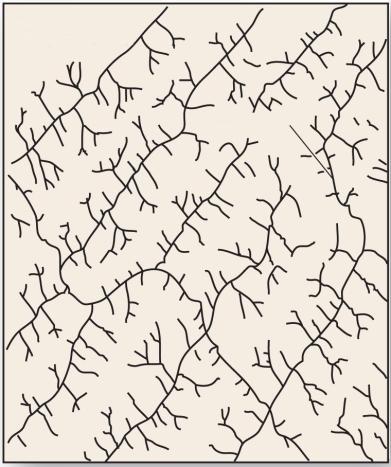
This drainage pattern is characteristic of dipping or folded topography.
A) annular
B) trellis
C) radial
D) rectangular

Unlock Deck
Unlock for access to all 154 flashcards in this deck.
Unlock Deck
k this deck
23
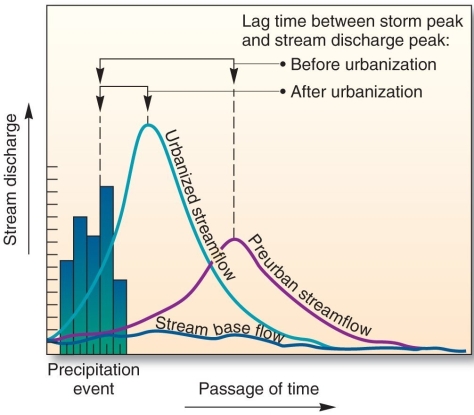
The effect of urbanization on a typical stream hydrograph is to
A) create a base flow.
B) increase lag time between storm peak and peak stream discharge.
C) decrease runoff.
D) decrease lag time between storm peak and peak stream discharge.

Unlock Deck
Unlock for access to all 154 flashcards in this deck.
Unlock Deck
k this deck
24
A mass of water above base level in a stream has ________ energy; as it flows downstream, this energy becomes ________ energy.
A) kinetic; potential
B) potential; kinetic
C) kinetic; kinetic
D) potential; potential
A) kinetic; potential
B) potential; kinetic
C) kinetic; kinetic
D) potential; potential

Unlock Deck
Unlock for access to all 154 flashcards in this deck.
Unlock Deck
k this deck
25
A squeeze-and-release action works to loosen and lift rocks in a stream channel. This is an example of
A) deposition.
B) hydraulic action.
C) abrasion.
D) suspension.
A) deposition.
B) hydraulic action.
C) abrasion.
D) suspension.

Unlock Deck
Unlock for access to all 154 flashcards in this deck.
Unlock Deck
k this deck
26
Which of the following may act as a local base level?
A) a lake that a river flows into
B) a drainage divide
C) the upper surface of a waterfall
D) an interfluve
A) a lake that a river flows into
B) a drainage divide
C) the upper surface of a waterfall
D) an interfluve

Unlock Deck
Unlock for access to all 154 flashcards in this deck.
Unlock Deck
k this deck
27
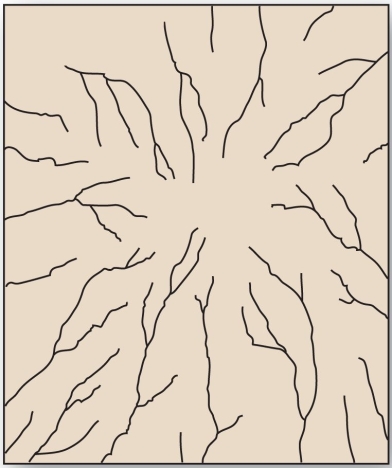
This drainage pattern results when streams flow off a central peak or dome.
A) annular
B) trellis
C) radial
D) rectangular

Unlock Deck
Unlock for access to all 154 flashcards in this deck.
Unlock Deck
k this deck
28
The degradation of a landscape by weathering, erosion, and transportation will ultimately reduce the landscape down to
A) base level.
B) continental shelf.
C) the mountain tops.
D) valley level.
A) base level.
B) continental shelf.
C) the mountain tops.
D) valley level.

Unlock Deck
Unlock for access to all 154 flashcards in this deck.
Unlock Deck
k this deck
29
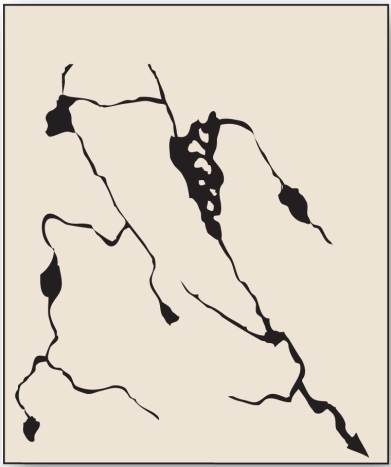
With no clear geometry and no true stream valley, this drainage pattern occurs in areas such as glaciated shield regions.
A) deranged
B) radial
C) parallel
D) dendritic

Unlock Deck
Unlock for access to all 154 flashcards in this deck.
Unlock Deck
k this deck
30
When a dam and reservoir are constructed, the natural response of the river and its channel gradient come under the control of
A) the same base level that existed prior to construction.
B) a local, or temporary, base level.
C) the government.
D) an ultimate base level.
A) the same base level that existed prior to construction.
B) a local, or temporary, base level.
C) the government.
D) an ultimate base level.

Unlock Deck
Unlock for access to all 154 flashcards in this deck.
Unlock Deck
k this deck
31
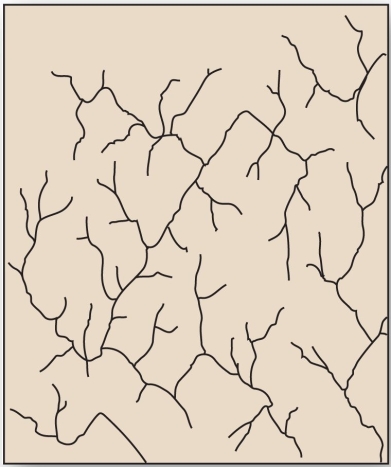
Faulted and jointed landscapes directs streams courses in patterns of right-angle turns forming this drainage pattern.
A) radial
B) rectangular
C) trellis
D) dendritic

Unlock Deck
Unlock for access to all 154 flashcards in this deck.
Unlock Deck
k this deck
32
Which of the following is used to measure streamflow?
A) stilling well and staff gauge
B) barometer and sling psychrometer
C) statistical methods of probability
D) reservoirs
A) stilling well and staff gauge
B) barometer and sling psychrometer
C) statistical methods of probability
D) reservoirs

Unlock Deck
Unlock for access to all 154 flashcards in this deck.
Unlock Deck
k this deck
33
The ultimate base level is
A) a drainage divide.
B) a dam.
C) sea level.
D) dependent on the geological substrate.
A) a drainage divide.
B) a dam.
C) sea level.
D) dependent on the geological substrate.

Unlock Deck
Unlock for access to all 154 flashcards in this deck.
Unlock Deck
k this deck
34
Which of the following landforms is incorrectly matched with a drainage pattern?
A) volcano - radial
B) folded mountain belt - trellis
C) eroded dome - annular
D) topographically disrupted areas - parallel
A) volcano - radial
B) folded mountain belt - trellis
C) eroded dome - annular
D) topographically disrupted areas - parallel

Unlock Deck
Unlock for access to all 154 flashcards in this deck.
Unlock Deck
k this deck
35
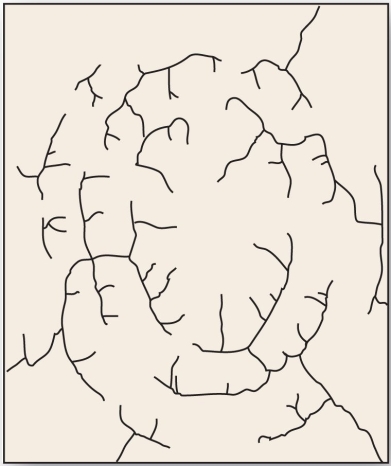
Structural domes with concentric patterns of rock strata guide stream courses to form this drainage pattern.
A) radial
B) parallel
C) annular
D) dendritic

Unlock Deck
Unlock for access to all 154 flashcards in this deck.
Unlock Deck
k this deck
36
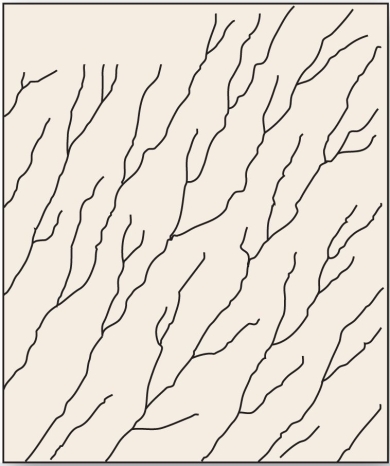
This drainage pattern is associated with steep slopes.
A) parallel
B) dendritic
C) trellis
D) deranged

Unlock Deck
Unlock for access to all 154 flashcards in this deck.
Unlock Deck
k this deck
37
A tributary that is physically unable to join the main channel on a floodplain due to natural levees is called a
A) alluvial stream.
B) yazoo tributary.
C) levee tributary.
D) meandering tributary.
A) alluvial stream.
B) yazoo tributary.
C) levee tributary.
D) meandering tributary.

Unlock Deck
Unlock for access to all 154 flashcards in this deck.
Unlock Deck
k this deck
38
John Wesley Powell put forward the idea of base level, which refers to
A) the amount of discharge in a particular reach of a stream.
B) a level below which a stream cannot erode its valley.
C) an evolutionary cycle of landscape development from fluvial action.
D) the average height of a stream channel.
A) the amount of discharge in a particular reach of a stream.
B) a level below which a stream cannot erode its valley.
C) an evolutionary cycle of landscape development from fluvial action.
D) the average height of a stream channel.

Unlock Deck
Unlock for access to all 154 flashcards in this deck.
Unlock Deck
k this deck
39
Which of the following lists of processes are in the correct sequence as to their occurrence in nature?
A) deposition, erosion, transport, weathering
B) weathering, erosion, deposition, transport
C) weathering, deposition, erosion, transport
D) weathering, erosion, transport, deposition
A) deposition, erosion, transport, weathering
B) weathering, erosion, deposition, transport
C) weathering, deposition, erosion, transport
D) weathering, erosion, transport, deposition

Unlock Deck
Unlock for access to all 154 flashcards in this deck.
Unlock Deck
k this deck
40
The drop in stream elevation per unit distance is known as
A) discharge.
B) base level.
C) gradient.
D) aspect.
A) discharge.
B) base level.
C) gradient.
D) aspect.

Unlock Deck
Unlock for access to all 154 flashcards in this deck.
Unlock Deck
k this deck
41
The portion of each meandering curve subject to the slowest water velocity undergoes aggradation. This results in a(n)
A) meander scar.
B) oxbow.
C) cutback.
D) point bar.
A) meander scar.
B) oxbow.
C) cutback.
D) point bar.

Unlock Deck
Unlock for access to all 154 flashcards in this deck.
Unlock Deck
k this deck
42
The largest material that can be carried by a stream is carried as
A) bed load.
B) suspended load.
C) dissolved load.
D) flow load.
A) bed load.
B) suspended load.
C) dissolved load.
D) flow load.

Unlock Deck
Unlock for access to all 154 flashcards in this deck.
Unlock Deck
k this deck
43
If the load exceeds a stream's capacity, sediment accumulates in the bed in a process called
A) downcutting.
B) degradation.
C) aggradation.
D) saltation.
A) downcutting.
B) degradation.
C) aggradation.
D) saltation.

Unlock Deck
Unlock for access to all 154 flashcards in this deck.
Unlock Deck
k this deck
44
As they migrate, meandering streams erode their out outside banks, often forming a narrow neck of land that eventually erodes through and forms a ________ and the stream becomes ________.
A) meander scar; narrower
B) cutoff; straighter
C) cutback; more sinuous
D) point bar; wider
A) meander scar; narrower
B) cutoff; straighter
C) cutback; more sinuous
D) point bar; wider

Unlock Deck
Unlock for access to all 154 flashcards in this deck.
Unlock Deck
k this deck
45
Excess sediment may result in which of the following channel patterns?
A) V-shaped valleys
B) braided stream
C) meandering stream
D) straight, steep-walled channels
A) V-shaped valleys
B) braided stream
C) meandering stream
D) straight, steep-walled channels

Unlock Deck
Unlock for access to all 154 flashcards in this deck.
Unlock Deck
k this deck
46
Bed load is moved by
A) saltation.
B) traction.
C) suspension.
D) saltation, traction, and suspension.
E) both saltation and traction, but not suspension.
A) saltation.
B) traction.
C) suspension.
D) saltation, traction, and suspension.
E) both saltation and traction, but not suspension.

Unlock Deck
Unlock for access to all 154 flashcards in this deck.
Unlock Deck
k this deck
47
Maximum velocity in a meandering stream is
A) near the bottom.
B) at the inner portion of the meander curve.
C) at the center and near the surface.
D) at the outer portion of the meander curve.
A) near the bottom.
B) at the inner portion of the meander curve.
C) at the center and near the surface.
D) at the outer portion of the meander curve.

Unlock Deck
Unlock for access to all 154 flashcards in this deck.
Unlock Deck
k this deck
48
Channels with gradual slopes often develop a sinuous form called a ________ pattern.
A) braided stream
B) anabranching
C) meandering stream
D) straight
A) braided stream
B) anabranching
C) meandering stream
D) straight

Unlock Deck
Unlock for access to all 154 flashcards in this deck.
Unlock Deck
k this deck
49
The main process contributing material in solution in sediment load is
A) physical weathering.
B) chemical weathering.
C) biological weathering.
D) erosion.
A) physical weathering.
B) chemical weathering.
C) biological weathering.
D) erosion.

Unlock Deck
Unlock for access to all 154 flashcards in this deck.
Unlock Deck
k this deck
50
The sediment load that travels in solution is
A) bed load.
B) suspended load.
C) dissolved load.
D) flow load.
A) bed load.
B) suspended load.
C) dissolved load.
D) flow load.

Unlock Deck
Unlock for access to all 154 flashcards in this deck.
Unlock Deck
k this deck
51
The portion of each meandering curve subject to the fastest water velocity undergoes the greatest erosive action. This action forms a steep
A) meander scar.
B) oxbow.
C) cutback.
D) point bar.
A) meander scar.
B) oxbow.
C) cutback.
D) point bar.

Unlock Deck
Unlock for access to all 154 flashcards in this deck.
Unlock Deck
k this deck
52
Stream transport involves all of the following except
A) saltation.
B) bed load.
C) traction.
D) sheet flow.
A) saltation.
B) bed load.
C) traction.
D) sheet flow.

Unlock Deck
Unlock for access to all 154 flashcards in this deck.
Unlock Deck
k this deck
53
Large river systems that have multiple large channels across a vast floodplain are termed
A) anabranching rivers.
B) braided streams.
C) meandering streams.
D) steep-walled channels.
A) anabranching rivers.
B) braided streams.
C) meandering streams.
D) steep-walled channels.

Unlock Deck
Unlock for access to all 154 flashcards in this deck.
Unlock Deck
k this deck
54
Maximum velocity in a straight channel is found
A) near the bottom.
B) near the inside of a meander.
C) at the center and near the surface, corresponding with the deepest parts of the stream channel.
D) at the center and near the surface, corresponding with the shallowest parts of the stream channel.
A) near the bottom.
B) near the inside of a meander.
C) at the center and near the surface, corresponding with the deepest parts of the stream channel.
D) at the center and near the surface, corresponding with the shallowest parts of the stream channel.

Unlock Deck
Unlock for access to all 154 flashcards in this deck.
Unlock Deck
k this deck
55
Braided streams are not found in
A) areas where the load is higher than the capacity.
B) bedrock-controlled channels.
C) streams subject to new sediment from glaciers or landslides.
D) locations subject to sediment deposition on the river bed.
A) areas where the load is higher than the capacity.
B) bedrock-controlled channels.
C) streams subject to new sediment from glaciers or landslides.
D) locations subject to sediment deposition on the river bed.

Unlock Deck
Unlock for access to all 154 flashcards in this deck.
Unlock Deck
k this deck
56
The sediment load consisting of coarse material too large to remain in suspension, moving along the channel bottom via traction and saltation is the
A) bed load.
B) suspended load.
C) dissolved load.
D) flow load.
A) bed load.
B) suspended load.
C) dissolved load.
D) flow load.

Unlock Deck
Unlock for access to all 154 flashcards in this deck.
Unlock Deck
k this deck
57
The sediment load consisting of fine-grained clastic particles held aloft in the stream is the
A) bed load.
B) suspended load.
C) dissolved load.
D) flow load.
A) bed load.
B) suspended load.
C) dissolved load.
D) flow load.

Unlock Deck
Unlock for access to all 154 flashcards in this deck.
Unlock Deck
k this deck
58
Stream piracy refers to
A) the legal process by which a state secures rights to the waters of a river basin.
B) the merging of two streams flowing in the same valley.
C) the process by which one channel erodes through a drainage divide and captures the headwater regions of another stream.
D) the illegal withdrawal of water from a river.
A) the legal process by which a state secures rights to the waters of a river basin.
B) the merging of two streams flowing in the same valley.
C) the process by which one channel erodes through a drainage divide and captures the headwater regions of another stream.
D) the illegal withdrawal of water from a river.

Unlock Deck
Unlock for access to all 154 flashcards in this deck.
Unlock Deck
k this deck
59
The suspended load of a stream consists of particles that are
A) rolled and bounced along the stream bed.
B) held aloft in the stream flow.
C) dragged along the stream bed.
D) dissolved in solution.
A) rolled and bounced along the stream bed.
B) held aloft in the stream flow.
C) dragged along the stream bed.
D) dissolved in solution.

Unlock Deck
Unlock for access to all 154 flashcards in this deck.
Unlock Deck
k this deck
60
A meandering stream is one that is
A) completely stable.
B) completely unstable.
C) delicately balanced between equilibrium and chaos.
D) closed in terms of energy and matter input.
A) completely stable.
B) completely unstable.
C) delicately balanced between equilibrium and chaos.
D) closed in terms of energy and matter input.

Unlock Deck
Unlock for access to all 154 flashcards in this deck.
Unlock Deck
k this deck
61
A stream becomes graded when
A) erosion and deposition are in equilibrium.
B) a local base level controls the stream.
C) a river achieves a longitudinal stream profile of a steeper upstream portion.
D) its basin becomes rejuvenated.
A) erosion and deposition are in equilibrium.
B) a local base level controls the stream.
C) a river achieves a longitudinal stream profile of a steeper upstream portion.
D) its basin becomes rejuvenated.

Unlock Deck
Unlock for access to all 154 flashcards in this deck.
Unlock Deck
k this deck
62
Which of the following is incorrectly matched?
A) cutbank - outer portion of a stream meander
B) point bar - area of substantial erosion
C) aggradation - sediment accumulation in the stream channel
D) braided stream - maze of interconnected channels
A) cutbank - outer portion of a stream meander
B) point bar - area of substantial erosion
C) aggradation - sediment accumulation in the stream channel
D) braided stream - maze of interconnected channels

Unlock Deck
Unlock for access to all 154 flashcards in this deck.
Unlock Deck
k this deck
63
The average size of sediment in a natural levee is ________ that found in the surrounding floodplain.
A) larger than
B) smaller than
C) the same size as
A) larger than
B) smaller than
C) the same size as

Unlock Deck
Unlock for access to all 154 flashcards in this deck.
Unlock Deck
k this deck
64
Which is typical of a rejuvenated system?
A) entrenched meanders
B) oxbow lakes
C) increased downcutting
D) terraces
E) entrenched meanders, increased downcutting and terraces
A) entrenched meanders
B) oxbow lakes
C) increased downcutting
D) terraces
E) entrenched meanders, increased downcutting and terraces

Unlock Deck
Unlock for access to all 154 flashcards in this deck.
Unlock Deck
k this deck
65
________ is the general term for unconsolidated clay, silt, sand, gravel, and mineral fragments deposited by running water.
A) Alluvium
B) Deposition
C) Aggradation
D) Degradation
A) Alluvium
B) Deposition
C) Aggradation
D) Degradation

Unlock Deck
Unlock for access to all 154 flashcards in this deck.
Unlock Deck
k this deck
66
Which of the following is likely to occur if the gradient of a stream increases? (Assume that the discharge and sediment load remain unchanged.)
A) The stream will begin to deposit more of its load.
B) The amount of aggradation in the channel will increase.
C) The amount of bed load transport will decrease.
D) The stream will begin to erode its channel and/or its banks.
A) The stream will begin to deposit more of its load.
B) The amount of aggradation in the channel will increase.
C) The amount of bed load transport will decrease.
D) The stream will begin to erode its channel and/or its banks.

Unlock Deck
Unlock for access to all 154 flashcards in this deck.
Unlock Deck
k this deck
67
Entrenchment of a channel occurs because
A) a decrease in stream gradient occurs.
B) a change in the bed load size-distribution occurs.
C) the river flows from consolidated rock into a region composed of loose sediments.
D) rejuvenation occurs due to uplift.
E) isostatic downwarping of the crust occurs.
A) a decrease in stream gradient occurs.
B) a change in the bed load size-distribution occurs.
C) the river flows from consolidated rock into a region composed of loose sediments.
D) rejuvenation occurs due to uplift.
E) isostatic downwarping of the crust occurs.

Unlock Deck
Unlock for access to all 154 flashcards in this deck.
Unlock Deck
k this deck
68
Which of the following is correct of the longitudinal profile of most rivers?
A) It always changes at a constant rate from the headwater region to the sea.
B) It is convex in shape.
C) It is concave in shape.
D) It is gentle upstream and steep downstream.
A) It always changes at a constant rate from the headwater region to the sea.
B) It is convex in shape.
C) It is concave in shape.
D) It is gentle upstream and steep downstream.

Unlock Deck
Unlock for access to all 154 flashcards in this deck.
Unlock Deck
k this deck
69
A yazoo tributary stream cannot join with the main river in an area because
A) the yazoo flows in a different valley.
B) a small structural ridge separates the rivers.
C) a natural levee on the main river prevents joining.
D) a man-made flow control structure keeps the rivers separate.
A) the yazoo flows in a different valley.
B) a small structural ridge separates the rivers.
C) a natural levee on the main river prevents joining.
D) a man-made flow control structure keeps the rivers separate.

Unlock Deck
Unlock for access to all 154 flashcards in this deck.
Unlock Deck
k this deck
70
A(n) ________ is a stream maintain an equilibrium between the processes of erosion and deposition and, therefore degradation and aggradation.
A) graded stream
B) oxbow
C) anabranching river
D) meandering stream
A) graded stream
B) oxbow
C) anabranching river
D) meandering stream

Unlock Deck
Unlock for access to all 154 flashcards in this deck.
Unlock Deck
k this deck
71
Which of the following is correct of a floodplain?
A) It is an erosional feature located within a depositional feature.
B) Floodplains are not associated with deposition.
C) It is generally filled with layers of alluvium.
D) Despite the name, they are rarely subjected to flooding.
A) It is an erosional feature located within a depositional feature.
B) Floodplains are not associated with deposition.
C) It is generally filled with layers of alluvium.
D) Despite the name, they are rarely subjected to flooding.

Unlock Deck
Unlock for access to all 154 flashcards in this deck.
Unlock Deck
k this deck
72
A stream that downcuts at the same rate as tectonic uplift, thereby maintaining its course is called a(n)
A) meandering stream.
B) anabranching river.
C) antecedent stream.
D) rejuvenated river.
A) meandering stream.
B) anabranching river.
C) antecedent stream.
D) rejuvenated river.

Unlock Deck
Unlock for access to all 154 flashcards in this deck.
Unlock Deck
k this deck
73
The entrenchment of a river into its own floodplain produces
A) backswamps.
B) alluvial terraces.
C) natural levees.
D) river deltas.
A) backswamps.
B) alluvial terraces.
C) natural levees.
D) river deltas.

Unlock Deck
Unlock for access to all 154 flashcards in this deck.
Unlock Deck
k this deck
74
Which of the following is incorrect regarding floodplains?
A) They are formed by recurrent flooding in the area adjacent to the stream.
B) Natural levees on either side of a stream are formed during times when the stream is at flood stage and overflows the bank.
C) They are generally low-lying areas.
D) They are characterized by rapids and low waterfalls.
A) They are formed by recurrent flooding in the area adjacent to the stream.
B) Natural levees on either side of a stream are formed during times when the stream is at flood stage and overflows the bank.
C) They are generally low-lying areas.
D) They are characterized by rapids and low waterfalls.

Unlock Deck
Unlock for access to all 154 flashcards in this deck.
Unlock Deck
k this deck
75
As a stream's velocity decreases, which of the following sizes of sediments will be deposited last?
A) gravel
B) sand
C) silt
D) clay
A) gravel
B) sand
C) silt
D) clay

Unlock Deck
Unlock for access to all 154 flashcards in this deck.
Unlock Deck
k this deck
76
An interruption in a stream's graded profile of equilibrium is called a
A) gradation.
B) longitudinal interruption.
C) base level.
D) nickpoint.
A) gradation.
B) longitudinal interruption.
C) base level.
D) nickpoint.

Unlock Deck
Unlock for access to all 154 flashcards in this deck.
Unlock Deck
k this deck
77
Which of the following is correct of floodplains?
A) They rarely occur in a fluvial landscape created by an "old" river.
B) They are erosional landforms.
C) They often evolve after a stream has ceased downcutting at a significant rate.
D) They are the areas of a stream where terraces are present.
A) They rarely occur in a fluvial landscape created by an "old" river.
B) They are erosional landforms.
C) They often evolve after a stream has ceased downcutting at a significant rate.
D) They are the areas of a stream where terraces are present.

Unlock Deck
Unlock for access to all 154 flashcards in this deck.
Unlock Deck
k this deck
78
Natural levees are created during
A) floods.
B) normal flow conditions.
C) low flow conditions.
D) degradation.
A) floods.
B) normal flow conditions.
C) low flow conditions.
D) degradation.

Unlock Deck
Unlock for access to all 154 flashcards in this deck.
Unlock Deck
k this deck
79
A(n) ________ is a meander that becomes isolated from the rest of the river.
A) owbow lake
B) undercut bank
C) point bar
D) cutoff
A) owbow lake
B) undercut bank
C) point bar
D) cutoff

Unlock Deck
Unlock for access to all 154 flashcards in this deck.
Unlock Deck
k this deck
80
A cutoff on a meandering stream results in the formation of
A) an oxbow lake.
B) a levee.
C) a point bar.
D) a terrace.
E) a braided stream.
A) an oxbow lake.
B) a levee.
C) a point bar.
D) a terrace.
E) a braided stream.

Unlock Deck
Unlock for access to all 154 flashcards in this deck.
Unlock Deck
k this deck


